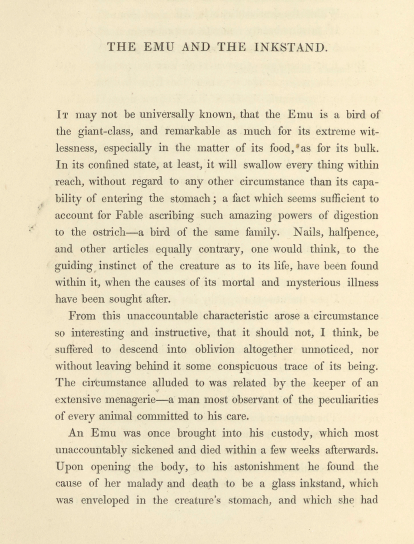The Emu and the Inkstand
by Anonymous
The Christian Keepsake and Missionary Annual, vol. 3 (1837)
Pages 198-200

Introductory Note: “The Emu and the Inkstand” provides an interesting allegorical lesson on judging others and making reparations for misjudgments. True to the Christian nature of its journal, The Christian Keepsake and Missionary Annual, this short story is both didactic and firm in its teaching of Christian morals.
IT may not be universally known, that the Emu is a bird of the giant-class, and remarkable as much for its extreme witlessness, especially in the matter of its food, as for its bulk. In its confined state, at least, it will swallow every thing within reach, without regard to any other circumstances than its capability of entering the stomach; a fact which seems sufficient to account for Fable ascribing such amazing powers of digestion to the ostrich—a bird of the same family. Nails, halfpence, and other articles equally contrary, one would think, to the guiding instinct of the creature as to its life, have been found within it, when the causes of its mortal and mysterious illness have been sought after.
From this unaccountable characteristic arose a circumstance so interesting and instructive, that it should not, I think, be suffered to descend into oblivion altogether unnoticed, nor without leaving behind it some conspicuous trace of its being. The circumstance alluded to was related by the keeper of an extensive menagerie—a man most observant of the peculiarities of every animal committed to his care.
An Emu was once brought into his custody, which most unaccountably sickened and died within a few weeks afterwards. Upon opening the body to his astonishment he found the cause of her malady and death to be a glass inkstand, which was enveloped in the creature’s stomach, and which she had previously swallowed. His wonder was now transferred from the cause of her death, to the manner in which she had possessed herself of so deadly a morsel; and to solve this mystery, he inquired of all connected with the menagerie; but none could at all elucidate the matter, and he was constrained to leave it shrouded in conjectural uncertainty.
But time, that great revealer of secrets, not long after brought the very captain by whom the Emu had been conveyed to the British shores to the keeper’s door. And the conversation turning upon the occasion of their former interview and acquaintance, he was told the circumstances of its death, and subsequent examination; and as the several particulars were related, an unlooked-for surprise and anxiety, accompanied by deep blushes, settled upon his countenance. At the close of the brief narrative, he paused a moment, and then said, “You will not wonder, Mr. ———, that your statement has so affected me, when I tell you that I fear it will too truly explain an event which occurred on my homeward voyage, and which now pains me exceedingly. Yet I would not but have heard that statement for a thousand times the value of the poor bird. Can you shew me the inkstand?” “O yes!” replied the keeper, as he took it from among the similar curiosities on his mantel-shelf, and put it into his hand, “here it is.” “This is the very thing,” rejoined the captain, “this inkstand was on the quarter-deck close by my side, when I last used it, and the hapless Emu was within an iron coop not far off. I had occasion to go into my cabin ere I had finished my letter, and, on my return, the inkstand had disappeared. Positive that I had left it on the deck, I made every inquiry, and ordered the strictest search after it, but in vain; none had touched it, none had seen it, nor was it any where to be found.
Far from imagining the true cause of my loss, the amount of which I was compelled to estimate not by cost, but the difficulty, if not impossibility, of then replacing it, I became excessively angry, and at once accused and condemned the poor fellow whom I had left in its neighbourhood, to be flogged for the suspected crime, notwithstanding his solemn protestations of innocence. He bore the grievous infliction with patience; for though a black, he was, I believe, a Christian. And now, Sir, I cannot rest till I have found him out, and made him full reparation.” So saying, the captain took up his hat, and hastily departed, leaving his host and family wondering not more at his recital, than at the power of that principle which drove him so unceremoniously from their company.
Reader, where is not the man who has so misjudged, so miscondemned, if not so unjustly punished, his brother? but where is he to be found who is equally prompt to retrace his steps, equally anxious to repair his fault?
Word Count: 757
Audiobook Format
Original Document

Topics
How To Cite (MLA Format)
“The Emu and the Inkstand.” The Christian Keepsake and Missionary Annual, vol. 3, 1837, pp. 198-200. Edited by Adam Sorenson. Victorian Short Fiction Project, 18 July 2025, https://vsfp.byu.edu/index.php/title/the-emu-and-the-inkstand/.
Editors
Adam Sorenson
Alayna Een
Isaac Robertson
Cosenza Hendrickson
Danny Daw
Alexandra Malouf
Posted
6 June 2020
Last modified
13 July 2025



